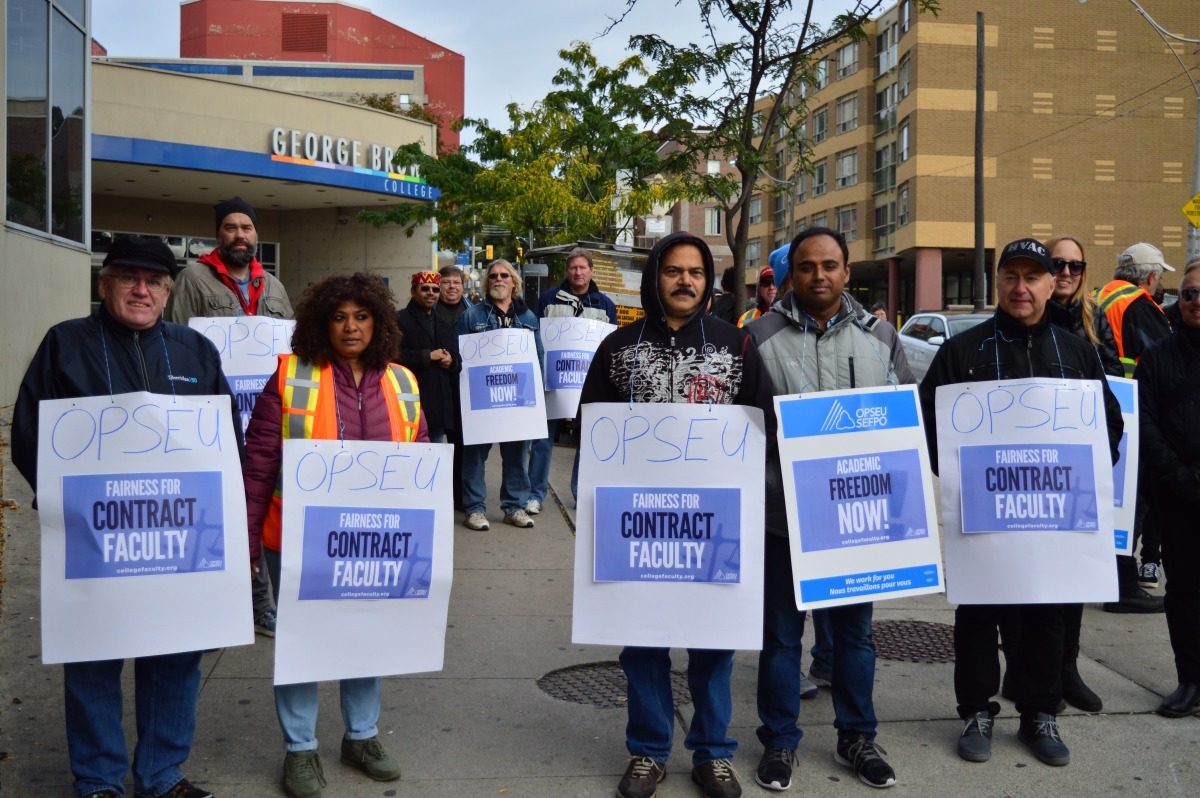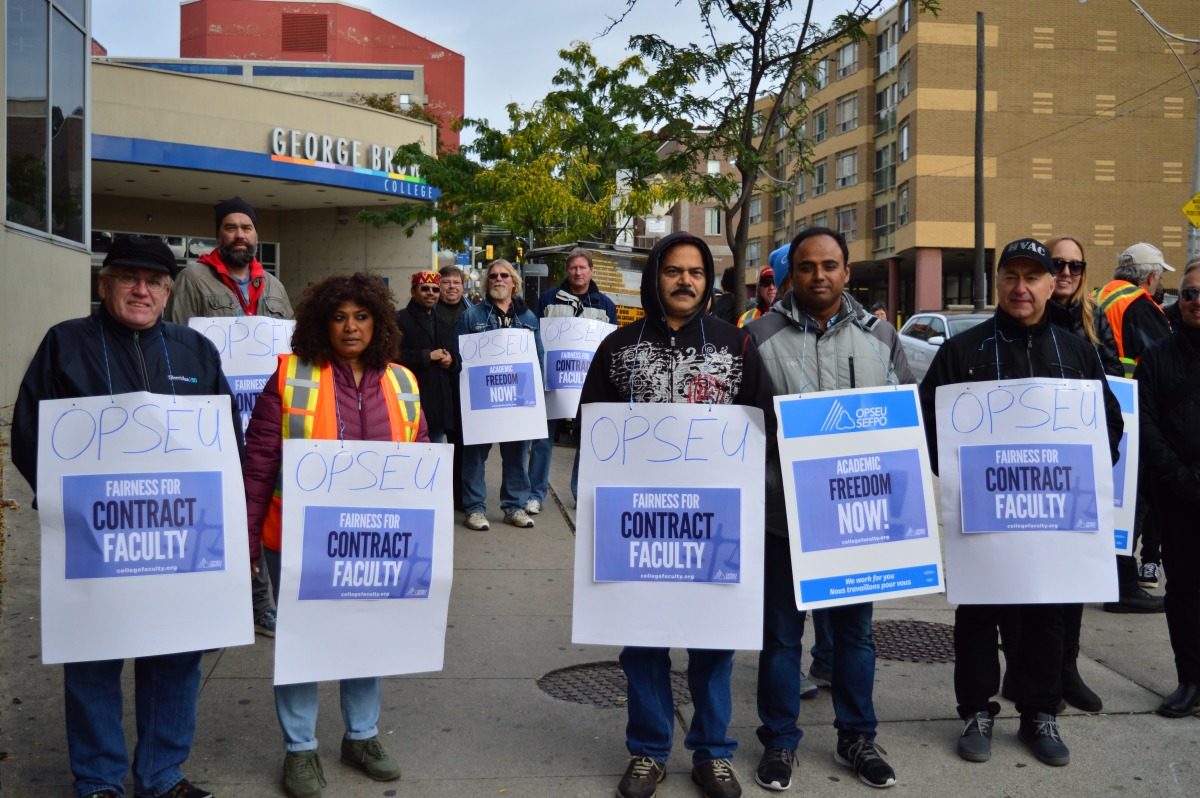Faculty strike averted at Ontario colleges as both sides agree to a new contract! After weeks of tense negotiations, faculty and college administrations reached a last-minute deal, averting a potentially disruptive strike that would have impacted thousands of students. This agreement marks a significant turning point in labor relations within the Ontario college system, with implications for both faculty and students alike.
The details of the agreement, including concessions from both sides, will be closely scrutinized for their impact on future negotiations and the overall learning environment.
This article will delve into the key provisions of the agreement, exploring the benefits for faculty, the concessions made by the colleges, and the overall impact on students. We’ll examine the perspectives of both faculty and college administrators, analyzing the financial implications and potential long-term effects on labor relations. Finally, we’ll look at the public’s reaction and media coverage of this significant event.
Ontario College Faculty Strike Averted: Agreement Details and Implications: Faculty Strike Averted At Ontario Colleges As Both Sides Agree To
The looming faculty strike at Ontario colleges has been averted thanks to a last-minute agreement between the faculty union and the college administration. This agreement, reached after intense negotiations, addresses several key concerns raised by faculty members while also considering the financial realities faced by the colleges. This article delves into the specifics of the agreement, its impact on students, faculty perspectives, the administration’s rationale, long-term implications, and the public’s reaction.
The Agreement’s Key Provisions

The agreement reached between the Ontario College Faculty Association (OCFA) and the College Employer Council (CEC) includes several key provisions that address faculty compensation, workload, and academic freedom. Both sides made concessions to reach this compromise, avoiding a potentially disruptive strike. This agreement differs from previous collective bargaining agreements in its emphasis on addressing workload concerns and incorporating more robust language around academic freedom.
While previous agreements focused primarily on salary increases, this one places a greater emphasis on improving working conditions and job security.
| Provision | Faculty Benefit | College Concession | Impact on Students |
|---|---|---|---|
| Salary Increase | Annual salary increases averaging 2% over three years. | Increased budget allocation for salaries. | Potentially improved instructor morale leading to better teaching. |
| Workload Reduction | Reduced teaching hours and increased prep time. | Re-allocation of resources and potential adjustments to course scheduling. | Possibly improved course quality and reduced instructor burnout. |
| Enhanced Academic Freedom | Clearer guidelines protecting academic freedom in curriculum development. | Acceptance of faculty input in curriculum design. | Potentially more innovative and relevant curriculum. |
| Improved Benefits | Increased access to professional development opportunities. | Increased budget allocation for professional development programs. | Potential for better-prepared instructors and improved course content. |
Impact on Students

The averted strike has significantly positive implications for students. The agreement ensures the continuation of classes and minimizes disruption to the academic calendar. While the agreement doesn’t directly address student fees, the improved working conditions for faculty may indirectly benefit students through improved teaching quality and reduced instructor burnout. A smoother learning environment, with better-prepared instructors, can translate to improved student learning outcomes.
- Positive Impacts: Continued access to classes and academic services; potentially improved teaching quality and course content; less stress for students due to avoidance of academic disruption.
- Negative Impacts: Potential for minor adjustments to course schedules; some services might experience temporary delays due to the agreement’s implementation.
Faculty Perspectives

Faculty members have expressed mixed reactions to the agreement. While many are relieved that a strike was averted, some express concerns that certain key demands were not fully met. Leading up to the agreement, faculty had expressed significant concerns regarding increasing workloads, lack of adequate preparation time, and insufficient resources. The agreement addresses some of these concerns through workload reductions and improved benefits, but some faculty members feel these improvements are not substantial enough.
For example, consider Professor Anya Sharma, a tenured professor in the English department. While she appreciates the salary increase, she remains concerned about the reduced prep time allotted for her advanced literature courses. She feels that the current allocation doesn’t allow her to properly prepare engaging and challenging course material. She believes that this provision, while a step forward, still leaves room for improvement.
So, the Ontario college faculty strike’s been avoided – good news! It’s a reminder that compromise is key, unlike in the case of Stuart Hogg, whose sentencing for domestic abuse is detailed here: Stuart Hogg sentenced for domestic abuse offences – Police Scotland. Hopefully, this stark contrast highlights the importance of respectful negotiation and conflict resolution, which ultimately led to the averted strike at the Ontario colleges.
College Administration’s Perspective, Faculty strike averted at Ontario colleges as both sides agree to
The college administration justified accepting the agreement by citing its commitment to providing a quality education for students while maintaining fiscal responsibility. The financial implications of the agreement are significant, requiring adjustments to budget allocations. While the colleges initially sought a more fiscally conservative agreement, they ultimately decided that avoiding a strike and maintaining a stable academic environment outweighed the financial considerations.
The agreement’s implementation might necessitate adjustments to college operations, such as course scheduling and resource allocation, in the upcoming academic year.
Long-Term Implications
This agreement sets a precedent for future contract negotiations within the Ontario college system. The emphasis on workload reduction and academic freedom could influence future bargaining strategies. Potential challenges may arise if the implementation of this agreement proves difficult or if economic conditions change, impacting the colleges’ ability to meet the terms of the agreement. A future negotiation scenario might involve a greater focus on performance-based metrics and a more detailed discussion on resource allocation to ensure both faculty satisfaction and fiscal responsibility.
Public Perception and Media Coverage

The public generally reacted positively to the averted strike, relieved that the disruption to student learning was avoided. Media coverage initially focused on the potential impact of a strike on students, highlighting the concerns of both students and faculty. After the agreement was reached, the media shifted its focus to the key provisions of the agreement and the concessions made by both sides.
This coverage helped shape public opinion, portraying the colleges and faculty in a more positive light than during the tense negotiation period.
| Headline | Quote | Source |
|---|---|---|
| “College Strike Averted: Students Breathe a Sigh of Relief” | “We’re happy to be back in class and that the disruption has been avoided.”
So, the Ontario college faculty strike is officially off! Both sides reached an agreement, which is great news for students. Meanwhile, in completely unrelated news, check out this awesome hockey game: Dubois scores twice, lifts Capitals past Canucks in OT. Back to the colleges, hopefully this means a smooth semester ahead for everyone involved.
|
Toronto Star |
| “Ontario College Faculty Secure Improved Working Conditions” | “This agreement represents a significant step forward in addressing faculty workload and promoting academic freedom.”
|
CBC News |
| “Colleges and Faculty Reach Tentative Agreement” | “We are pleased to have reached a fair and responsible agreement that ensures the continued quality of education for our students.”
So, the Ontario college faculty strike’s been avoided – good news for students! It’s a relief after all that tension. Speaking of stressful situations, check out this article about Actor Steve Guttenberg recounts his Palisades Fire experience ; it’s a wild story. Anyway, back to the colleges – hopefully, this means smooth sailing ahead for everyone involved.
|
Global News |
Final Thoughts
The averted faculty strike at Ontario colleges represents a significant victory for both sides, avoiding a potentially disastrous disruption to the academic year. The agreement, while requiring concessions from both faculty and college administrations, sets a precedent for future negotiations and highlights the importance of collaborative problem-solving in higher education. The long-term implications remain to be seen, but the immediate impact is a sigh of relief for students and a renewed focus on teaching and learning.
Helpful Answers
What were the main sticking points in the negotiations?
Common sticking points often include salary increases, benefits packages, workload, and job security.
How long were the negotiations?
The duration of negotiations varies greatly depending on the complexity of the issues and the willingness of both parties to compromise. It could range from weeks to months.
What happens if there’s a disagreement in the future?
Future disagreements may lead to further negotiations, mediation, or, as a last resort, another strike.
What is the role of the government in these negotiations?
The government often plays a mediating or oversight role, particularly regarding funding and policy implications.
